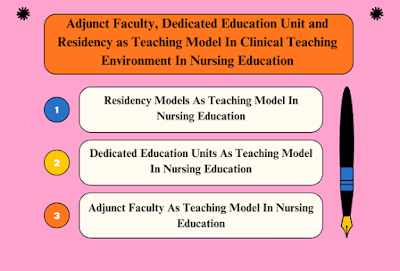The Adjunct Faculty Dedicated Education Unit and Residency as Teaching Model In Clinical Teaching Environment In Nursing Education. The Dedicated Education Unit (DEU) employs nurses who have a desire to teach as clinical educators and prepares them for their role.
The Adjunct Faculty Dedicated Education Unit and Residency as Teaching Model In Clinical Teaching Environment In Nursing Education
In clinical nursing education, adjunct professors, Dedicated Education Units (DEUs), and residency programs offer a variety of teaching models that can be effectively used in clinical education. DEUs are innovative models that involve collaboration between nurse educators and clinical settings to enable effective clinical learning. Residency programs provide newly qualified nurses with structured clinical experiences, and adjunct professors can contribute their practical experience and knowledge to clinical training.
Dedicated Education Unit and Residency In the rapidly evolving field of nursing education, innovative teaching models are crucial for preparing students to meet the demands of modern healthcare. Among these models, Adjunct Faculty, Dedicated Education Units (DEUs), and Residency Programs stand out as effective approaches for enhancing clinical teaching environments.
1. Adjunct Faculty in Nursing Education
Adjunct faculty play a pivotal role in nursing education, bridging the gap between academic knowledge and practical healthcare experience. These part-time professionals, often employed in healthcare settings, serve as preceptors, mentors, guest lecturers, and supervisors.
Adjunct faculty are experts in clinical practice, research, leadership, and healthcare law, providing students with real-world insights and mentorship. By collaborating on research and guiding students through clinical experiences, adjunct faculty contribute significantly to the development of future nurses.
2. Dedicated Education Units (DEUs) as a Teaching Model
The Dedicated Education Unit (DEU) model has gained traction over the last decade as an innovative partnership between nursing schools and healthcare institutions. DEUs transform patient care units into learning environments where students and staff nurses collaborate, providing quality care while learning on the job.
According to Moscato et al. (2007), DEUs create a more integrated connection between nursing education programs and clinical practice. Students in DEUs often report better learning experiences compared to traditional placements. Universities across the U.S. have adopted variations of this model, such as the Practice Education Partnership (PEP) units, which emphasize collaboration and consistency in preceptor-student relationships.
Research by Mulready Shick et al. (2013) shows that DEUs enhance relationship-building between academia and clinical practice, fostering a more enriching educational experience for nursing students.
3. Residency Programs in Nursing Education
Residency programs address the gap between academic preparation and real-world nursing practice. As prelicensure programs may not fully prepare nurses for the complexities of modern healthcare, postgraduate residencies offer a critical transition period. Studies (Benner et al., 2010; Institute of Medicine, 2010) have highlighted the need for these programs to improve leadership and population management skills.
The American Association of Colleges of Nursing (AACN) has developed a 12-month residency program aimed at enhancing competencies and easing nurses’ transition into practice. Similarly, the National Council of State Boards of Nursing (NCSBN) has created a framework for standardized residency programs to support new nurses.
Research suggests that nurse residency programs boost confidence, competence, and retention rates, but further studies are needed to assess their impact on patient outcomes (Goode et al., 2013).
4. Conclusion: Evolving Nursing Education Models
As healthcare systems become more complex, nursing education must adapt to prepare students for the challenges ahead. Adjunct faculty, DEUs, and residency programs are just a few of the collaborative teaching models shaping the future of nursing education. These models provide hands-on experience, leadership development, and stronger connections between academic learning and clinical practice.
Further research is needed to fully understand the impact of these models on student success and patient care outcomes. Nevertheless, they represent a promising shift towards more integrated and practical nursing education.
Read More:
https://nurseseducator.com/didactic-and-dialectic-teaching-rationale-for-team-based-learning/
https://nurseseducator.com/high-fidelity-simulation-use-in-nursing-education/
First NCLEX Exam Center In Pakistan From Lahore (Mall of Lahore) to the Global Nursing
Categories of Journals: W, X, Y and Z Category Journal In Nursing Education
AI in Healthcare Content Creation: A Double-Edged Sword and Scary
Social Links:
https://www.facebook.com/nurseseducator/
https://www.instagram.com/nurseseducator/
https://www.pinterest.com/NursesEducator/
https://www.linkedin.com/in/nurseseducator/
https://www.researchgate.net/profile/Afza-Lal-Din
https://scholar.google.com/citations?hl=en&user=F0XY9vQAAAAJ
